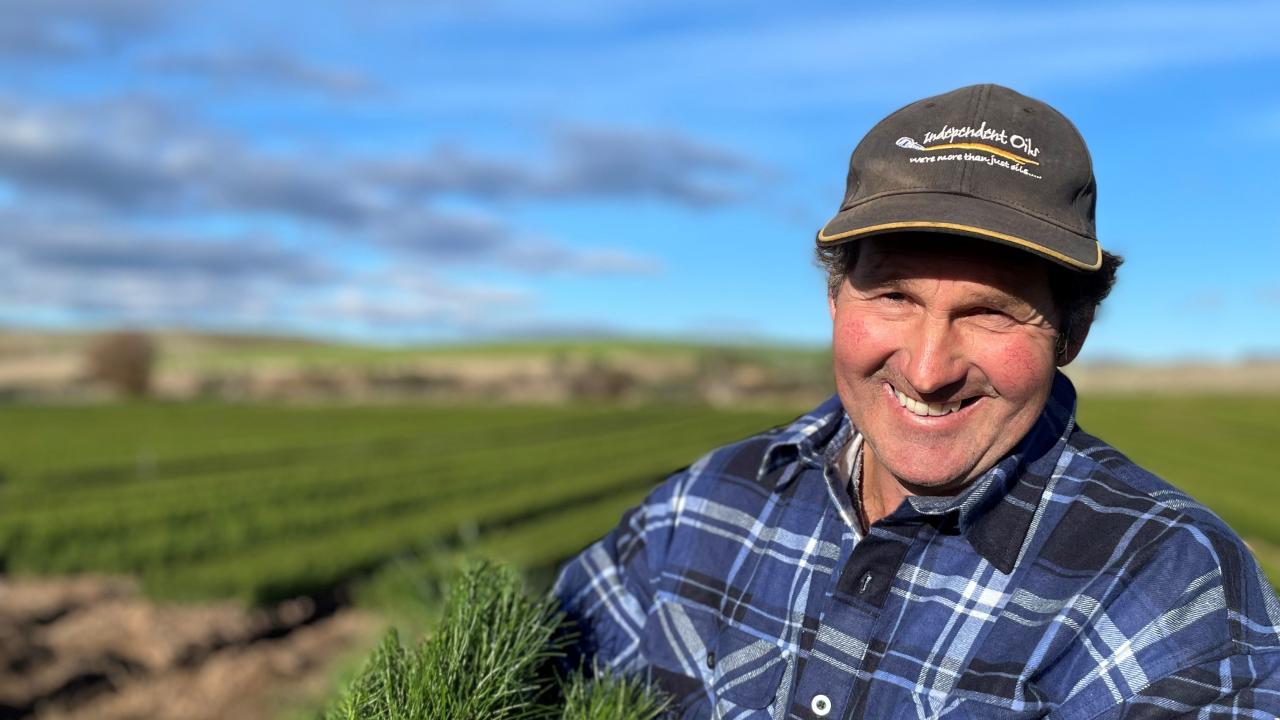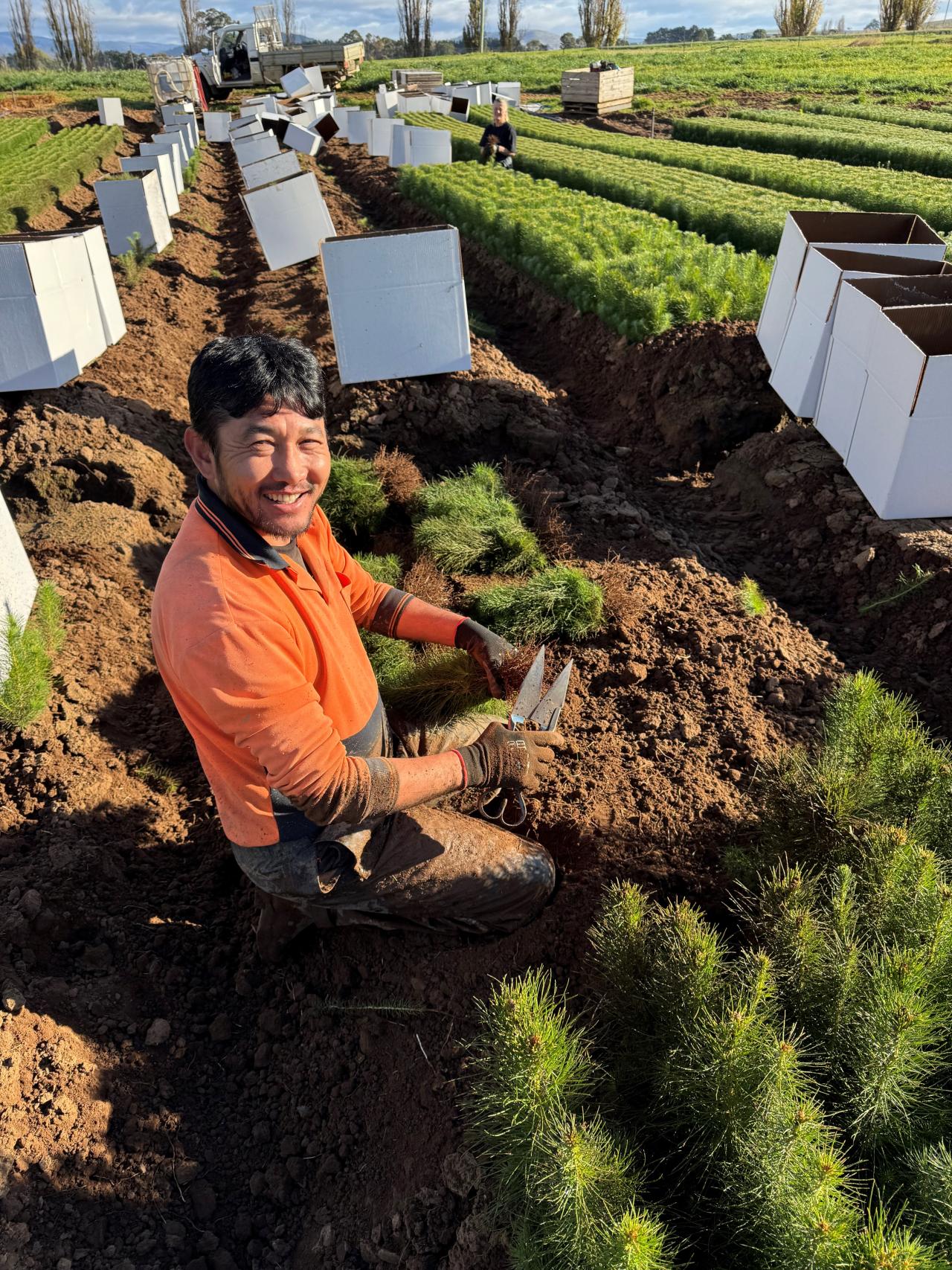All change as Todd's mistake pays off

One-and-a-half million baby pine trees growing at Bushby Park are thriving like never before, thanks to a mistake by their grower and a change in farming practise.
Property lessee and owner of nearby Rockhill Estate at Ellendale, Todd Rayner, produces pinus radiata seedlings for use in the forestry industry and for farmers who want shelter belts, small investment plots on unproductive land or to gain carbon credits.
His 15 hectares beside the Styx River has about three hectares dedicated to the tree nursery, while the rest is used to grow potatoes and garlic.
Five years ago he pulled out the sprinklers in the nursery to work up the tree beds and unintentionally put the beds back about half a row further across to where they had been.
That growing season the trees that grew where the sprinkler lanes had previously been positioned were twice as big as the others.
Other than move position we had done nothing different,” Todd admitted.
“I started to think, we’re going to have to seriously look at our soil – unless you’d seen it you wouldn’t have believed it.
“This was when I started researching regenerative farming, watching YouTube and attending field days on the subject – I realised that what I’d been doing to look after the soil was not working.”

Since then Todd has been adding compost to the ground, either growing manure crops or adding up to 100 metres of compost per hectare sourced from Nick Hanson at Old Beach.
A mix of council green material, cherry waste and other green waste goes into what Todd describes as the best compost he’s ever seen.
“I started to think about the microbes in the soil and started planting mixed species manure crops, with up to 15 species in the mix to create a diverse range of microbes.
“Between all of that we’ve improved our soil and the carbon levels have gone up, and the trees have never been healthier.
“We’re not organic but we’re really trying to avoid spraying fungicides – we get a bit of disease but the plants can handle that now.
“The few trees we lose is more than outweighed by the savings in cost on fungicide.”
Because the pine trees rely on a fungus called mycorrhiza to supply nutrients to the tree roots, eliminating fungicide has increased the mycorrhiza 5 to 10-fold, Todd said.
“I switched to organic fertiliser and I’m using slow-release chicken manure pellets.
“We still have a spraying regime – but it’s seaweed and worm juice.
“Basically we’ve cut back pesticides by about 75 percent, and while the trees are susceptible to thrips the plants aren’t as lush at any given time so they don’t go after them as much.”
Todd also gets extra nitrogen from using a slow release urea which releases over 12 weeks and is also better for the microbes.
The pine tree seed is sourced mainly from Australia or from New Zealand by request from clients.
It’s vacuum drilled into the worm-filled soil in October and after it’s germinated and started to grow a machine is used to go under the rows and cut the tap root to a depth of 10cm.
A lateral pruner cuts the lateral roots, and the top is trimmed to 30-35cm.
“When the trees are only a couple of centimetres high their tap root is already about 30cm long, it’s incredible and that’s why they grow so fast,” Todd said.
To take care of any more root growth another run of the bar under the trees hardens the trees off by encouraging more root growth in and around the tree, which gets them ready for harvest and lowers transplant shock.
This year’s harvest is well underway, having started late due to the recent dry spell.
The trimmed little trees have their roots sprayed with transport gel and are packed up ready to transport.
On his Elendale property Todd grows blueberries, blackberries and runs a few cross breed sheep for fat lambs.
The fruit is sold at the News Norfolk weekly market on Saturday’s and the Farmgate market in Hobart on Sundays.
During peak growing season he also has a roadside stall at Granton.
Todd doesn’t like to have his soil exposed and after harvest gets ground cover on quickly by sowing oats, ideally getting a silage cut off it in the spring, but if not it gets worked in.
“You have to keep looking for new and better ways to do things, and when you see something work you have your proof and that’s what regenerative farming is doing for us.
“A good friend and Nutrien agronomist Peter Morrison has helped me out a lot with the regen farming and it’s great knowing he thinks the same way as me.
“Our new methods are showing in our products and it’s nice to be able to tell customers we’re using hardly any spray and they tell us our fruit and vegetables are the best they’re ever had.”




Add new comment
Comments
Todd and regen farming.
Great work keep it up.
😁👍